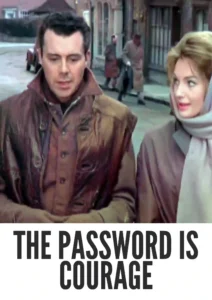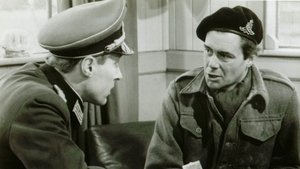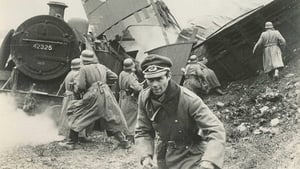Contact: info@alwanfilm.com
Video Sources 0 Views
- Watch trailer
- The Password Is Courage 1962 Colorized


Synopsis
Table of Contents
ToggleReview: The Password Is Courage 1962 Colorized – An In-Depth Look at the WWII Classic

Introduction
In the pantheon of World War II films, “The Password Is Courage 1962” holds a distinguished place with its blend of historical drama and gripping storytelling. Directed by the esteemed Andrew L. Stone, this film recounts the true story of a brave British soldier’s efforts to escape from a German POW camp. Notably, this film, with its powerful narrative and dynamic performances, has been presented to audiences in various formats, including its recent restoration and re-release. This article delves into the significance of “The Password Is Courage 1962,” exploring its impact, historical context, and the nuances of its cinematic presentation.
Check The Full Colorized Movies List
Check Our Colorized Movies Trailer Channel
Understanding The Password Is Courage 1962 Colorized: Director, Cast, and Genre
Director’s Vision
Andrew L. Stone, known for his deft touch in both suspense and drama, brings a compelling narrative to life with “The Password Is Courage 1962.” Stone’s direction is marked by a meticulous attention to detail, capturing the tension and resilience of wartime experiences with authenticity and depth. His vision for the film was not just to recount a historical event but to bring the emotional and psychological complexities of war to the forefront.
The Iconic Performances
The film stars Dirk Bogarde as the protagonist, Lieutenant Colonel Anthony O’Connell, whose real-life story serves as the foundation for the film. Bogarde’s portrayal is both nuanced and compelling, capturing the grit and determination of a man facing unimaginable odds. The supporting cast includes the talented Maria Schell and the ever-reliable Michael Ripper, each bringing their characters to life with vivid performances that enhance the film’s dramatic impact.
Genre and Cinematic Style
“The Password Is Courage 1962” falls squarely within the genre of war drama, a genre characterized by its focus on the human experiences and moral dilemmas faced during wartime. Stone’s approach combines intense action sequences with reflective moments of character development, creating a balanced narrative that resonates deeply with audiences.
Exploring the World of The Password Is Courage 1962 Colorized: Plot and Characters
Synopsis
The film is based on the true story of Lieutenant Colonel Anthony O’Connell, who was captured during World War II and imprisoned in a German POW camp. Despite the harsh conditions and constant surveillance, O’Connell’s spirit remains unbroken as he orchestrates a daring escape plan. The plot follows his ingenious and audacious attempts to outwit his captors and make his way back to Allied lines.
Key Moments
The film is marked by several key moments that highlight O’Connell’s bravery and resourcefulness. One of the most gripping scenes involves a meticulously planned escape attempt that showcases both the ingenuity and desperation of the protagonist. The tension builds as O’Connell and his fellow prisoners face numerous obstacles, including betrayal and unexpected setbacks, underscoring the perilous nature of their mission.
Complex Protagonist and Supporting Characters
Dirk Bogarde’s portrayal of O’Connell brings depth to the character, depicting him as a leader who combines strategic brilliance with a deep sense of duty. Maria Schell’s role as the female lead adds a layer of emotional complexity, while Michael Ripper’s performance as a fellow prisoner provides additional support and insight into the camaraderie and struggles within the camp.
The Art of War Films
War Films and Historical Representation
War films have long been a staple of cinema, offering both dramatic storytelling and historical insights. The genre’s appeal lies in its ability to portray the heroism, tragedy, and complexity of wartime experiences. “The Password Is Courage 1962” contributes to this tradition by focusing on a lesser-known but remarkable story of resilience and escape.
Artistic and Technical Aspects
The artistic elements of “The Password Is Courage 1962” include its use of set design, costuming, and cinematography to recreate the ambiance of a World War II POW camp. The technical aspects, including the film’s pacing and suspenseful score, contribute to an immersive viewing experience that captures the tension and stakes of the narrative.
Early War Films: A Brief History
Evolution of the Genre
The early days of war cinema were marked by a focus on propaganda and patriotic themes. Over time, however, the genre evolved to include more nuanced portrayals of conflict, emphasizing individual stories and emotional depth. From the heroic epics of the 1940s to the more reflective and critical approaches of the 1960s and beyond, war films have continually adapted to reflect changing attitudes and cinematic trends.
Impact of Early War Films
Early war films played a crucial role in shaping public perceptions of conflict and heroism. They provided audiences with both a sense of connection to and a greater understanding of the experiences of soldiers and civilians alike. “The Password Is Courage 1962” fits within this tradition, offering a detailed and personal perspective on wartime bravery and sacrifice.
The Password Is Courage 1962 and Its Historical Context
Authenticity and Adaptation
“The Password Is Courage 1962” is a testament to the power of storytelling in preserving historical events. The film’s adaptation of Lieutenant Colonel Anthony O’Connell’s story is marked by a commitment to authenticity, though some creative liberties are taken to enhance the narrative’s dramatic effect. The balance between historical accuracy and cinematic dramatization is a key aspect of the film’s appeal and impact.
Impact on Public Perception
The film contributed to the broader understanding of the experiences of POWs during World War II, highlighting the resilience and resourcefulness required to survive and escape from captivity. By focusing on a specific and dramatic story, “The Password Is Courage 1962” helps to shed light on the broader context of wartime struggles and the human spirit’s capacity for endurance.
The Debate Over Historical Representation in War Films
Historical Accuracy vs. Dramatic License
The representation of historical events in cinema often involves a delicate balance between accuracy and dramatic license. While “The Password Is Courage 1962” strives for historical fidelity, certain aspects of the story are dramatized to enhance the narrative. This raises important questions about the responsibilities of filmmakers in portraying historical events and the impact of these portrayals on public perception.
The Role of Entertainment in Education
War films like “The Password Is Courage 1962” play a significant role in educating audiences about historical events, even as they entertain. The challenge lies in ensuring that these portrayals are both engaging and respectful of the real experiences of those involved. The film’s success in this regard reflects its ability to capture the essence of O’Connell’s story while providing an accessible and compelling narrative.
Examining The Password Is Courage 1962 Colorized as a Classic War Film
Cinematic Impact
“The Password Is Courage 1962” is considered a classic within the war film genre, noted for its strong performances, gripping storyline, and historical relevance. The film’s impact extends beyond its immediate reception, influencing subsequent portrayals of wartime heroism and escape narratives in cinema.
Legacy and Influence
The film’s legacy lies in its ability to capture the complexities of wartime experiences and the human spirit’s resilience. Its influence can be seen in later films that explore similar themes of bravery, survival, and ingenuity. By contributing to the genre’s evolution, “The Password Is Courage 1962” remains a significant work in the context of wartime storytelling.
Influence and Legacy: The Password Is Courage 1962 Colorized’s Impact on Cinema
Cinematic Influence
The influence of “The Password Is Courage 1962” extends to both its immediate impact on viewers and its broader contributions to the war film genre. The film’s approach to storytelling, character development, and historical representation has informed subsequent works that explore similar themes of conflict and survival.
Cultural Legacy
The cultural legacy of “The Password Is Courage 1962” lies in its portrayal of individual bravery and the broader human experiences of war. By focusing on a specific story of escape and resilience, the film contributes to a deeper understanding of the sacrifices and struggles faced by those who lived through World War II.
Director’s Cinematic Legacy: Beyond The Password Is Courage 1962 Colorized
Andrew L. Stone’s Influence
Andrew L. Stone’s career extends beyond “The Password Is Courage 1962,” encompassing a range of films that showcase his skill in suspense and drama. His contributions to cinema include a variety of genres and themes, reflecting his versatility and creative vision.
Impact on Filmmaking
Stone’s work has influenced both contemporary and later filmmakers, particularly in the realm of dramatic and suspenseful storytelling. His ability to create compelling narratives and vivid characters has left a lasting mark on the industry, contributing to the evolution of cinematic techniques and storytelling approaches.
Themes Explored in The Password Is Courage 1962 Colorized
Courage and Resilience
The central themes of “The Password Is Courage 1962” revolve around courage and resilience, exploring the lengths to which individuals will go to secure their freedom and survive against overwhelming odds. The film’s portrayal of these themes provides a powerful commentary on the human spirit’s capacity for endurance and bravery.
Moral and Ethical Dilemmas
The film also delves into moral and ethical dilemmas faced by the characters, particularly in the context of wartime situations. The choices made by O’Connell and his fellow prisoners highlight the complexities of survival, loyalty, and sacrifice, offering a nuanced view of the challenges faced during conflict.
Reception and Controversy Surrounding The Password Is Courage 1962 Colorized
Critical Reception
Upon its release, “The Password Is Courage 1962” received praise for its strong performances, compelling narrative, and attention to historical detail. Critics lauded Dirk Bogarde’s portrayal of O’Connell and Andrew L. Stone’s direction, highlighting the film’s effectiveness in capturing the drama and tension of wartime escape.
Controversies and Debates
As with many historical films, “The Password Is Courage 1962” has faced debates regarding its portrayal of historical events. While some critics argue that the film takes creative liberties, others appreciate its ability to bring a significant story to a wider audience. The discussions surrounding the film reflect broader debates about the balance between historical accuracy and cinematic storytelling.
Where to Watch The Password Is Courage 1962 Colorized Online
Availability
For those interested in experiencing “The Password Is Courage 1962,” the film is available on various streaming platforms and through physical media. Its availability ensures that audiences can access this classic war drama and appreciate its contributions to the genre and cinematic history.
Streaming Options
Check popular streaming services and digital platforms for availability. The film’s restoration and re-release offer new opportunities for viewers to engage with its powerful narrative and historical significance.
FAQs About The Password Is Courage 1962 Colorized
Q: Is “The Password Is Courage 1962” based on a true story?
A: Yes, the film is based on the real-life experiences of Lieutenant Colonel Anthony O’Connell, who was captured during World War II and orchestrated a daring escape from a German POW camp.
Q: What is the significance of the film’s title?
A: The title “The Password Is Courage” reflects the central theme of the film, emphasizing the bravery and determination required to overcome adversity and achieve freedom.
Q: How does the film portray the experiences of POWs?
A: The film provides a detailed and dramatic portrayal of the experiences of POWs, focusing on the challenges and ingenuity required to survive and escape from captivity.
Conclusion
“The Password Is Courage 1962” remains a powerful testament to the bravery and resilience of those who endured the hardships of World War II. Andrew L. Stone’s direction and Dirk Bogarde’s compelling performance bring to life a remarkable story of courage and escape. As audiences continue to engage with this classic film, its impact on the war genre and its contribution to historical storytelling remain enduringly relevant. By exploring both the dramatic elements and historical context of “The Password Is Courage 1962,” we gain a deeper appreciation for the sacrifices and stories that define the human experience in times of conflict.











